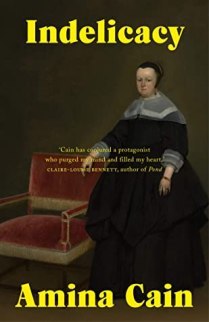Indelicacy by Amina Cain | Book Review
Indelicacy by Amina Cain
Published by Daunt Books, 2020
Rating: 


 This is one of those reads that’s tricky to quantify my feelings for. In a nutshell: I liked it, but I wanted to love it; and I think it’s a good book, but it had all the component parts of a great one.
This is one of those reads that’s tricky to quantify my feelings for. In a nutshell: I liked it, but I wanted to love it; and I think it’s a good book, but it had all the component parts of a great one.
Set in an undisclosed time and place – though reading predominantly like Victorian Britain – we follow the first-person narration of Vitória, a young woman who works as a cleaner in a museum. Captivated by the art it houses, she longs to be a writer, discussing and critiquing the works rather than tidying up around them. To achieve this, she resolves to marry a wealthy man so she can afford to leave her job and pursue her dream. But it soon becomes clear that climbing the social ladder will not be enough to grant her true freedom.
There’s so much to love here: Simple yet brilliant prose; a snarky, headstrong protagonist; an immersive atmosphere; well navigated themes of class, gender roles, desire, and loneliness. The trouble is it never reaches a crescendo. The book is described as “a ghost story without a ghost”, and while this is reflective of the cloying tone and the constant feeling that we’re building towards some kind of breaking point, it suggests a sinister turn that simply never comes. This, coupled with some very well established, though frustratingly unexplored queer undertones, left me feeling as though the book could have hit home its points about suppression and longing with much greater power. Instead, it sets up all the right ingredients and then fizzles out somewhat.
Still, I can say I genuinely enjoyed the time I spent with this novel, and I would certainly check out more from Amina Cain. I think it’s also worth pointing out that, though I said the book predominantly reads like it’s set in Victorian Britain, occasional fleeting references hint at a more modern timeframe. This subtle yet clever device leaves you to consider how much things have really changed for women over the years, and the cyclical nature of patriarchal oppression – within the arts and more widely.



